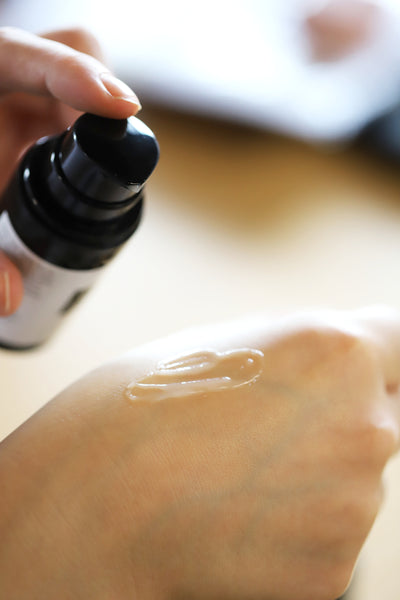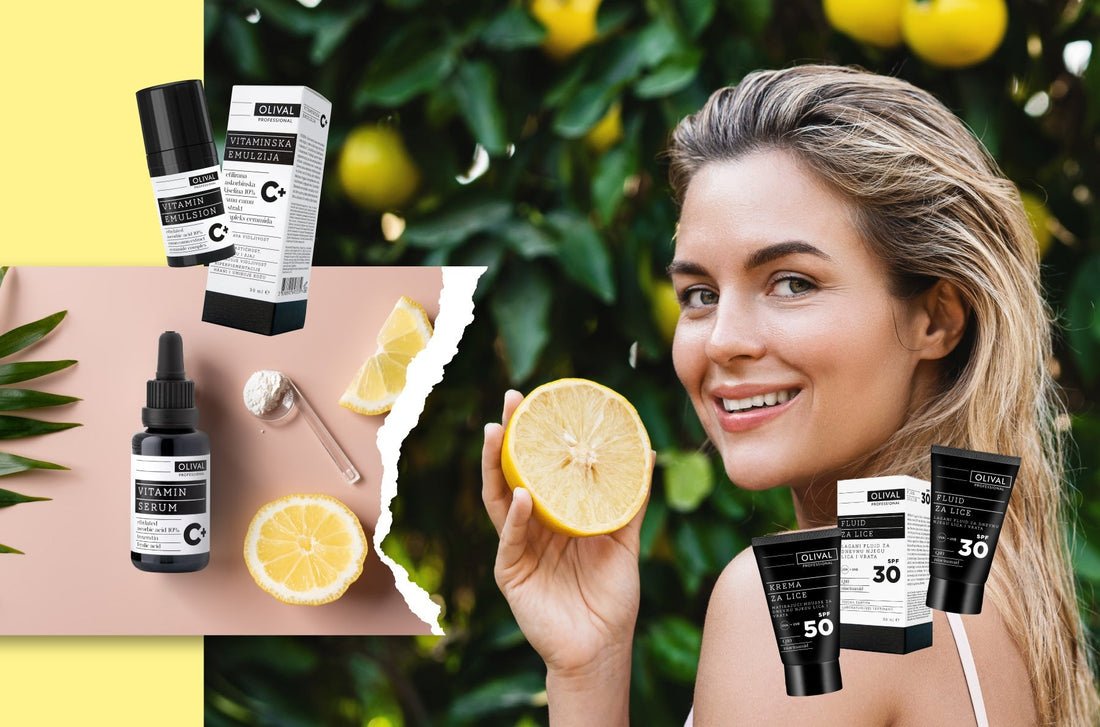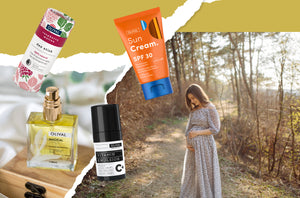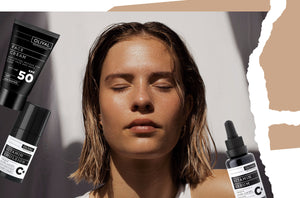Vitamin C is already a well-known member of many skincare routines, but new forms and modern formulations contribute to the ever-widening popularization of this ingredient in skin care. In the guide, find out everything you need to know about vitamin C, its advanced forms, action and effects, as well as which serum product from the Professional collection to choose according to your skin type and condition.
Vitamin C is like a superfood for the skin
This well-known ingredient in skin care did not become famous by accident. Vitamin C brings various proven benefits such as refreshing the complexion and reducing blemishes. It energizes the skin, restores its shine and youthful appearance. What is important to emphasize is that not all vitamins C, including products based on them, have equal properties and performance .

Perhaps the most famous form of vitamin C is ascorbic acid. However, despite its extraordinary active action and potency, pure ascorbic acid is very unstable, oxidizes easily and in the medium (the product itself) requires a low, acidic pH in order to be effective. Because of all the above, it is not the best choice for sensitive skin.
Why vitamin C found its way into our routines
We mostly know about this vitamin from nutrition; we need it for the proper functioning of the body. It has also been proven to bring significant improvements in skin care. It is primarily an antioxidant that protects the skin from oxidative stress by donating electrons that neutralize free radicals. This is extremely important in an environment where we are surrounded by smog, cigarette smoke and most importantly, UV radiation. Moreover, experts recommend using sun protection products in synergy with antioxidants, and vitamin C is the best choice. It does not absorb UV rays, but provides a photoprotective effect, which makes protection from the sun complete and optimal. [1]

Vitamin C also stimulates the synthesis of collagen, having a long-term effect on the firmness, fullness and tone of the skin . It also has an anti-inflammatory effect, which is why it can help skin with acne and rosacea, and another important effect is depigmentation. It reduces the production of melanin and thereby reduces the possibility of hyperpigmentation, while reducing the existing ones . Precisely because of the reduction of melanin production, it is necessary and desirable to have SPF in the routine along with vitamin C. The effect in practice, of course, depends on the form of vitamin C and the overall formulation.
Discover today's most advanced vitamin C
In search of the right synergy, over time the formulation of vitamin products turned from classic ascorbic acid to other forms (derivatives) of vitamin C such as sodium ascorbyl phosphate (SAP), ascorbyl glucoside (AA-2G), magnesium ascorbyl phosphate (MAP), etc. Such derivatives are significantly more resistant to oxidation, and due to the higher pH values needed for stability and effectiveness, they are also suitable for sensitive skin. However, as the products progress, so does knowledge about the forms of vitamin C. Over the years, more and more advanced derivatives, more stable and more powerful, appear. Currently, the most advanced form can certainly be called ethylated ascorbic acid (EAA; 3-O-Ethyl Ascorbic Acid) .

Its modified molecular structure (with an ethyl group at the position of the third carbon atom) contributes to a better protection of the molecule against oxidation. It is one of the most stable vitamin C derivatives in general. Ethylated ascorbic acid brings all the benefits of classic ascorbic acid with a different and more neutral pH required for activity. It also favors more sensitive skin types. It has significantly increased stability, but also better availability and longer-lasting effectiveness. Due to the neutral pH, products with this vitamin C can be combined with niacinamide even in the same routine since there is no collision of different pH values and hydrolysis of niacinamide that can cause redness.
Look for products that contain ferulic acid and vitamin E
In addition to the form of vitamin C, the overall formulation is important. The combination of ethyl ascorbic acid, ferulic acid and vitamin E proved to be an established and highly effective formula. Every respectable serum should contain this trio of ingredients. Ferulic acid and vitamin E are valuable ingredients in skin care, but also in the formulation with vitamin C in which they help preserve the stability and potency of this valuable ingredient. Ferulic acid shows exceptional antioxidant properties, and it is interesting that it is strengthened precisely by exposure to UV radiation. This is why it is useful in products that are applied in the morning with SPF. On the other hand, vitamin E is also, due to its strong effect on free radicals, the gold standard of cosmetics which aims to act against premature signs of aging.

Additional antioxidants are certainly desirable. Olival Professional Vitamin Serum C+ also contains troxerutin, which enhances the absorption of vitamin C, promotes regeneration and relieves redness, ectoine, which strengthens the skin's natural barrier, and hyaluronic acid for hydration. It is ideal for normal, mixed and oily skin prone to dehydration.
Vitamin emulsion C+ , in addition to the magical trio of ingredients, also contains camu camu extract as an additional bioavailable source of vitamin C, as well as other minerals, sugar, amino acids and fruit acids. Its effect has a positive effect on strength, elasticity, tone and luminosity. The formulation is rounded off by a complex of ceramides, which are similar to the natural properties of the skin and support the self-regulation of moisture and resistance. It will be an excellent choice for dry, normal and mature skin with signs of aging.
When (and how) it is recommended to use
One thing is certain - vitamin C is not prohibited in the skin care routine when staying in the sun . The old myth has already been overcome many times by numerous evidences that speak to the benefit of strengthening the photoprotective potential and improving the protection of the skin from the sun precisely through strong antioxidant action, even during the summer [2] . At the same time, the morning is the ideal time for antioxidant care with a minimum of SPF 30 , since this leaves room for other active ingredients such as retinoids and acids in the evening routine, thus reducing the possibility of irritation.
------------------------------------------------
[1] Pumori Saokar Telang. Vitamin C in Dermatology. Indian Dermatol Online J. 2013 Apr-Jun; 4(2): 143–146. https://www.ncbi.nlm.nih.gov/pmc/articles/PMC3673383/ , accessed 8/24/2022.
[2] D Darr 1, S Dunston, H Faust, S Pinnell. Effectiveness of antioxidants (vitamin C and E) with and without sunscreens as topical photoprotectants. Acta Derm Venereol. 1996 Jul;76(4):264-8. https://pubmed.ncbi.nlm.nih.gov/8869680/ , accessed 8/24/2022.






